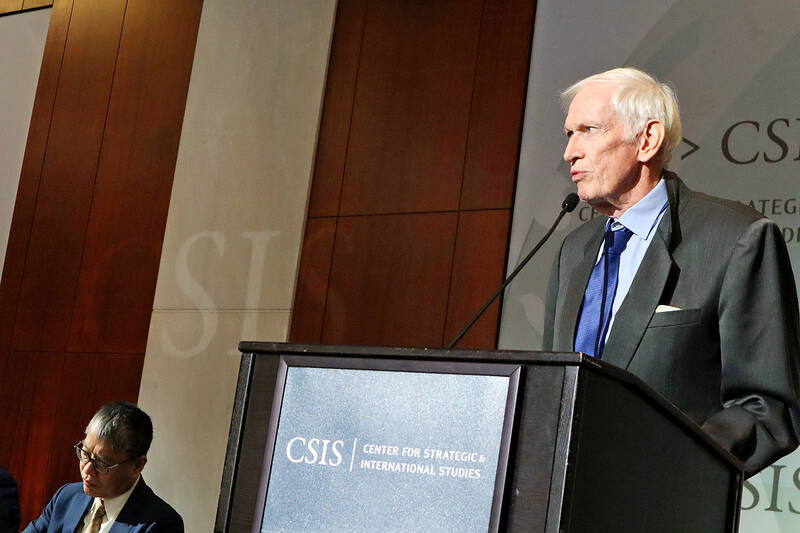China’s “Anti-Secession” Law is a “ticking time bomb,” former American Institute in Taiwan (AIT) chairman James Moriarty said in Washington on Tuesday.
Moriarty made the remarks during a panel discussion entitled “Employing ‘Non-Peaceful’ Means Against Taiwan: The Implications of China’s Anti-Secession Law,” cohosted by the Center for Strategic and International Studies think tank and the Taiwan-based Prospect Foundation.
The 2005 “Anti-Secession” Law is China’s legal basis for punishing Taiwanese desires for independence, the panel said, as Article 8 reserves the right for China to resort to force to “unify” with Taiwan if the possibility of peaceful “reunification” is ever lost.

Photo: CNA
China on June 21 published 22 new guidelines that allow its courts to try in absentia and sentence to death “Taiwanese independence separatists.”
Moriarty called the law “a horrible thing” and said that it “asserted a sovereignty over Taiwan” that the People’s Republic of China lacks.
Article 8 allows China to decide when the hope of “unifying” with Taiwan has been lost, he said.
In giving context to the period when the law was passed, Moriarty admitted that former president Chen Shui-bian (陳水扁) did “have us scared” when he attempted to push for a referendum for Taiwan to enter the UN, which could have unilaterally altered the status quo in the Taiwan Strait, a situation opposed by the US.
Moriarty said that the situation has now changed and that on his recent visit to Taiwan, there was no evidence that the nation was moving toward independence under three consecutive Democratic Progressive Party presidential terms.
When bringing up the potential for a peaceful, non-coercive unification between the two sides of the Strait, he said he “certainly” does not see it in the foreseeable future, citing global events such as the Hong Kong protest movement and the war in Ukraine, that have provided lessons for Taiwanese voters.
Given Taiwan’s democratic system, the “well-informed electorate” is “in control” of any unification process, Moriarty said.
While Taiwan has changed in the past two decades, China is no longer flexible or “willing to kick the can down the road” as it was under former Chinese presidents Hu Jintao (胡錦濤) and Jiang Zemin (江澤民), he said.
The new guidelines have put pressure on the Chinese authorities to act against Taiwanese independence and that under one-man rule, China has become increasingly unpredictable.
“We don’t want [Chinese President] Xi Jinping (習近平) to wake up one day and say ‘today is the day we can make it work’” he said about a potential invasion of Taiwan.
He called for other nations to provide an effective deterrent and to do so quickly, so that Xi would choose not to start a war, and to push back against legislation such as the “Anti-Secession” Law.

‘DENIAL DEFENSE’: The US would increase its military presence with uncrewed ships, and submarines, while boosting defense in the Indo-Pacific, a Pete Hegseth memo said The US is reorienting its military strategy to focus primarily on deterring a potential Chinese invasion of Taiwan, a memo signed by US Secretary of Defense Pete Hegseth showed. The memo also called on Taiwan to increase its defense spending. The document, known as the “Interim National Defense Strategic Guidance,” was distributed this month and detailed the national defense plans of US President Donald Trump’s administration, an article in the Washington Post said on Saturday. It outlines how the US can prepare for a potential war with China and defend itself from threats in the “near abroad,” including Greenland and the Panama

The Chinese Nationalist Party (KMT) is maintaining close ties with Beijing, the Democratic Progressive Party (DPP) said yesterday, hours after a new round of Chinese military drills in the Taiwan Strait began. Political parties in a democracy have a responsibility to be loyal to the nation and defend its sovereignty, DPP spokesman Justin Wu (吳崢) told a news conference in Taipei. His comments came hours after Beijing announced via Chinese state media that the Chinese People’s Liberation Army’s Eastern Theater Command was holding large-scale drills simulating a multi-pronged attack on Taiwan. Contrary to the KMT’s claims that it is staunchly anti-communist, KMT Deputy

RESPONSE: The government would investigate incidents of Taiwanese entertainers in China promoting CCP propaganda online in contravention of the law, the source said Taiwanese entertainers living in China who are found to have contravened cross-strait regulations or collaborated with the Chinese Communist Party (CCP) could be subject to fines, a source said on Sunday. Several Taiwanese entertainers have posted on the social media platform Sina Weibo saying that Taiwan “must be returned” to China, and sharing news articles from Chinese state media. In response, the Mainland Affairs Council (MAC) has asked the Ministry of Culture to investigate whether the entertainers had contravened any laws, and asked for them to be questioned upon their return to Taiwan, an official familiar with the matter said. To curb repeated

Myanmar has turned down an offer of assistance from Taiwanese search-and-rescue teams after a magnitude 7.7 earthquake struck the nation on Friday last week, saying other international aid is sufficient, the National Fire Agency said yesterday. More than 1,700 have been killed and 3,400 injured in the quake that struck near the central Myanmar city of Mandalay early on Friday afternoon, followed minutes later by a magnitude 6.7 aftershock. Worldwide, 13 international search-and-rescue teams have been deployed, with another 13 teams mobilizing, the agency said. Taiwan’s search-and-rescue teams were on standby, but have since been told to stand down, as